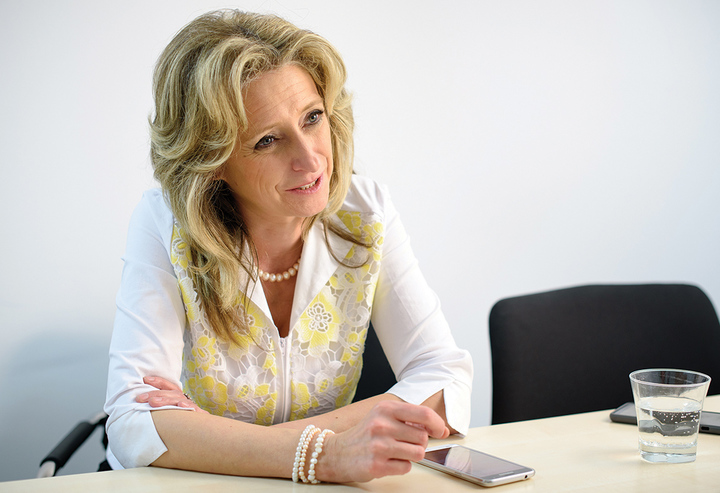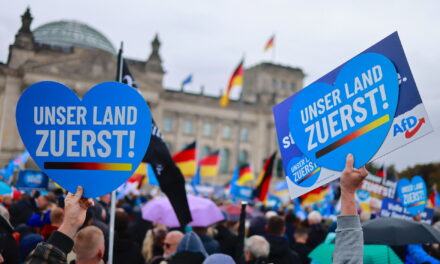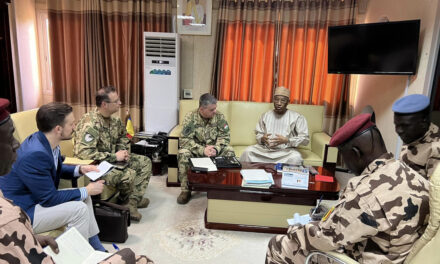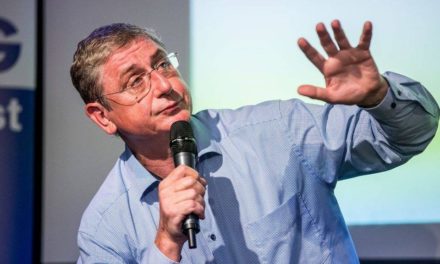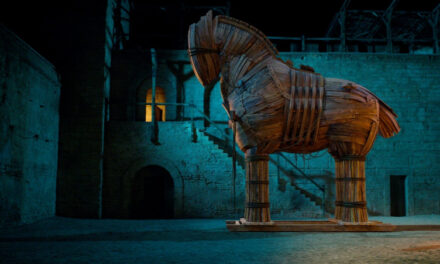We talked with Orsolya Ferencz about whether the European Union is still democratic, what extreme anarchism wants, whether accountability can be avoided, and how to interpret the papal admonitions? The ministerial commissioner responsible for space research also sent a message to the right-wing camp.
Does the European Union still work democratically?
It is a difficult and important question whether it operates along the principle and legal foundations laid down by the founding fathers. However, the answer requires an overview of the definitions of the basic terms, who understands what by the principle of democracy, the rule of law, what do we call human rights and can they be alienated from natural rights? And this train of thought eventually leads to the question that clarifies the concept of man. Who considers what a person today? Are we living in posthumanism, in an age after man? Or can we return to the foundations, to the triple pillar - Greek philosophy, Roman law and Judeo-Christian morality - on which Europe was built?
And if we clarify the historical and philosophical propositions, then we have to ask the final question, is there a God? Or is everything relative, everything depends only on us, the truth is also relative and everyone is their own little god?
Because these two worlds are incompatible, antagonistic opposites.
Can the EU's "moving" rules be fixed? And while we're at it: the Union fell into handling the 2015 refugee crisis, then Covid, and now the war. In which direction are we moving? Towards a United States of Europe or towards disintegration?
The truth is that the rules were fixed. Democracy means that the people with the right to vote decide where a society should go next. A country is democratic if it listens to the voice of its people and acts according to it - according to the legal principles that govern society and the moral principles behind them. I see that the current voices of the EU, both in the Parliament and in the Commission, want a new, different approach, according to which it is not the voice of the European citizens that prevails, but other principles. They want to implement top-down decision-making in a way that cannot be controlled or held accountable. This is far from my idea of democracy, but our goal is not to break up the EU, but to return it to its original, Christian foundations, as the founding fathers intended, and rebuild it.
As the Holy Father touched on this in many of his speeches during his visit: let's build a European Union that is diverse, takes into account the unique values of peoples, and uses their individuality as a resource, rather than kneading it into a mass, into a federal nightmare.
The handling of migration or sanctions has also shown that where the principle of subsidiarity is violated, where construction from the bottom up is reversed and the will of a narrow elite is imposed on people from above, in a dictatorial manner, a problem arises. We saw this with Covid, and to this day, the decision-makers responsible for vaccine treatment, such as the president of the European Commission, cannot be held accountable for exactly with whom, on the basis of which authority, and how they negotiated deals worth billions of euros. But we also see this in the case of sanctions, where the interests of the people are not taken into account, but some kind of political pressure from outside the Union is taking place. And we see this in the management of migration as well. However, a distinction must be made between genuine refugees, who need help in the name of morality and the Geneva Convention, and those who arrive for other purposes, "bypassing the gates".
However, the current leadership of the Union is interested in blurring these two categories, so the question arises, what is the driving force behind their decisions?
So we can say that these are worrisome processes that need to be answered. Hungary's thousand-year mission is to be a defense line along Christian values, a kind of watchtower. The Holy Father's message was quite clear in this area as well, he said on Kossuth Square that he is sending a message to the European Union with a call to faith and peace from this noble city and the country of the Virgin Mary.
Is there a chance for a real political turnaround with the current EU leadership?
Obviously, the fate of the Union must be entrusted to politicians who are aware of the problems and want to work honestly, in the interest of the European people. I would like to note that Brussels is walking on thin ice when it comes to honor, because we are at the very beginning of uncovering a spreading corruption network, a network that is shocking both in terms of its size and nature. It seems that on a business-like, systemic level, often illegitimate governments outside the EU, but background power interests, influenced EU policy through certain politicians. All of this - in addition to moral judgment - also conflicts with legal principles; if it is a rule of law. First of all, we should work on holding those involved in corruption accountable, but until this happens, we cannot expect these politicians to be capable of implementing the turnaround, without which the European Union will only bring its own destruction closer.
Is Hungary able to act effectively against the road roller of the gender lobby, or has it absorbed us over time along with the cultural changes of the Western world?
Then let's ask the question: is this something new or is it just new to us? We are talking about a very serious ideological and moral war, which is (also) outlined behind the gender phenomenon. Certain ideas have been trying to conceptually define man himself for centuries. The gender struggle and the woke madness have roots in the history of ideas. They claim that the concept of man can be completely reinterpreted, and they consider it the alpha and omega of freedom if the creature called man is freed from all laws, including biological and other laws of nature. Sexuality other than heterosexual is considered to be of a higher order, since the different has already exceeded the constraints of biology. This kind of extreme anarchism, which calls itself liberalism, has long been separated from the classical liberalism of the history of ideas, and the new liberalism thinks that everything that is order and law is only a limitation and an obstacle to be overcome.
This is the crux of the problem. To defeat belief in God, God himself, and the rules of the created world.
But to answer the question: why would you sweep us away? There have been many attempts, but they could not and cannot sweep away the Church of Christ, nor the faith in God. And our job is not to ruminate on the future in despair, but to fight these wars armed with the armor of education and faith. According to our faith, there is truth, there is one truth and that is God himself, so we do not fight unarmed. On the other hand, there is no doubt that the intensity is new, but it comes from our time, where due to global communication the earth has collapsed, if you will, it has shrunk into a single global village. Therefore, both good and bad effects are getting around sooner than centuries ago.
A person feels in his gut that he does not want to live in an anarchist woke society, and he feels this way because he comes into the world as a seeker of God from the beginning and is able to distinguish between good and bad.
We are talking on May 1st, and after a thorough review of the press, it seems as if right-wing and left-wing journalists have not been listening to the same pope. Do we understand or misunderstand the Holy Father?
I think that exaggeration is not new either, everyone likes to interpret the words of the Holy Father according to their own taste. But let's not do that! I recommend examining all the speeches of Pope Francis' stay here together as a single structure. Each of his utterances was a brick of the "cathedral of the soul" to which the Holy Father invited us.
They were extremely complex lines of thought.
That's right. Of course, you can pick out half-sentences from periods and commas, but by doing so we also mislead ourselves, especially others; you have to see it all together. By the way, I would also like to send a message to our own side, in addition to the fact that the left's distortion of facts can be seen in action in many ways, but we are not perfect either. Man is not perfect, because only God is. “Why do you call me good? No one is good but God.” (Luke 18)
That's why we should also come to ourselves and be kind enough to reflect a little more self-critically on the Holy Father's words.
Obviously, when we read things like those written by W. Árpád Tóta again, then the rightful temper boils over in a person. But we have to be more than that. If we are truly Christian people, then we must not only forgive, but also pray for these people, because God's miracles are endless, the Holy Spirit is everywhere, and not a single person should be given up. If we pray only for those who do us good, how are we different from the heathen? I think the Holy Father has conveyed this message many times, of course you can twist his words, but this is an unnecessary and futile effort on the part of the other side, because the truth always prevails in the end.
Why do you think that a symbolic incident - such as the recent shooting of the Swiss wolf or the pardon of György Budaházy by the President of the Republic - causes such hysterical and extreme reactions in Hungarian society? Could this have anything to do with the removal of the lustration law, the unhealed wound of the sense of social justice? Is it possible that the Hungarian people feel that accountability can be avoided, just as it was in the past?
It is a difficult dilemma as to how well the administration of justice and the administration of justice are brought into line. But this is not new either, every age has struggled with it. Saint László himself wrote that it is not possible to exercise worldly power without committing the most serious sins. The repeal of the Zétényi-Takács law had many consequences, indeed, some of our institutional and political structures were not able to adequately cleanse themselves of the legacy of the dictatorship. But we also have to add that the philosophical root of the problem can be traced back to the totalitarian ideas that caused the deaths of hundreds of millions, of which only one, Nazism, was – very correctly – held accountable. However, they treat communism very permissively, this circle of ideas is especially advanced in the Union, they inaugurate a statue of Marx and Lenin, so it's not that they don't face the crimes, but they even legitimize them afterwards.
Accountability was therefore not only not done in Hungary, but even where there was a lustration law, it was not possible to really cleanse the thinking itself of this spirit.
I'm not a lawyer, but I can say in relation to the Budaházy case that no Christian can legitimize the beating of anyone, or the use of force by anyone to assert their rights. I think that the convicts of the Hunnia trial may have done something that cannot be accepted in any way. But grace is not absolution.
These people have regretted what they have done, and from now on it would be nothing but cruelty to continue to drag them around.
And when and what in society can be used for bullying? Unfortunately, everything. Anyone who wants to hit can always find a stick. A cruel act against an animal can be used for good or bad in communication. I don't think it's right how human society treats the living world and the biosphere.
I think that we should enforce the responsibility towards the created world and the fair and loving treatment of animals even in the education of our children.
Let me refer to Saint Francis of Assisi: if eight hundred years ago someone was able to enforce this principle - Saint Francis of Assisi is also the patron saint of animals - then we have no choice but to extend our humanity to the biosphere, which should not have masters, but caretakers, good owners, to be. Of course, anything can be used to create a huge media campaign, but let me ask you something:
on what basis does the same site go beyond the killing of millions of fetuses, on what basis do they deny the child in the womb that he is also a human being, on what basis do they dispute whether he feels pain?
These are the questions that the left cannot ethically answer, but as we can see, it also generously ignores the relevant parts of Pope Francis' speeches.
As well as his statements regarding the liberalization of euthanasia...
Exactly. But the culture of death cannot be accepted. Human life is sacred. Why holy? Because it is from God. Christian morality states that God himself is absolute. In the posthuman, transhuman present, man wants to act as a creator.
At the Pázmány Péter Catholic University, Pope Francis told us as a sort of closing thought that although technology and knowledge are a wonderful gift from God, we cannot put them in His place.
Let us recall that in the Jacobin frenzy known as the great French Revolution of 1789, God was removed from the altar of Notre-Dame and replaced by the goddess of ratio. This was a very clear satanic reference to the fact that man, through his knowledge, can put himself in the place of God. Let's not do this, because it is certain that our business will fail. We must return to God, and by accepting our smallness, we can become nobler in God's infinity. This is the only way.
Can next year's US presidential election bring relief to the war situation?
I am not an expert on US domestic politics, but I would like to ask that the United States and all countries on earth work for peace. This sounds like a sweet message, but if we take it seriously, we realize how difficult and tiring it is to settle one conflict at a time while moving towards peace in the midst of disputes. How much easier it is to say a number, even in our personal life, than to think about how I can become an instrument of peace in a conflict situation.
Whoever is the next president of the United States, and whatever political current prevails over the other, he cannot absolve himself of political responsibility, because the whole of humanity, and even the biosphere, can come under attack if any great power instigates conflicts whose existence and escalation threatens the entire Earth.
Only with joint responsibility can we create the home where the biosphere can continue to exist safely. If we do not understand the responsibility arising from our number of employees and our technological development, then we do not understand anything. The United States also has responsibilities commensurate with its size. Hungary, for example, voluntarily took on a responsibility far greater than its size when, in the face of the world's war-crazed chorus, it cried out for peace in the European Union as a single voice alongside the Vatican.
Our country is the center of the world in peacetime, and the edge of empires in the event of a conflict. What do you think, will we be the winners or losers of this war, which was started against our will and regardless of us, in which Hungarians also die?
The global crisis we are facing is very complex. On the one hand, there is the tilting of the geopolitical status quo and the resulting security policy conflict, which may escalate, and on the other hand, a set of social crisis symptoms is being outlined, which is also global. The Holy Father also spoke a lot about the spread of nihilism. And there is a set of natural-environmental disasters that also cause enormous problems. These can and do excite each other. With our rational self, we need to recognize the problems we face, for example
in the face of Marxist and anarchist pseudo-green movements, we really have to understand the challenges and give them quick, correct, professional answers.
When transforming the German energy system, for example, political activism prevailed over professionalism, and accordingly, Germany not only reduces, but is currently increasing carbon dioxide emissions in the name of greening – it closed its nuclear power plants and opened lignite ones, and even built new ones.
The main question is, after we have interpreted the complex set of problems together with other countries, can we change the way of thinking of our societies, both locally and globally?
Hungary can be the catalyst of this process, we can be a good example, but ultimately we only have a chance to be saved if the federal system in which we exist is also saved. Let's just look at the map: we live in the Carpathian basin, we must protect the fresh waters that flow through us with responsible water management in which we must involve all the countries around us; a common water management plan is needed in a drying Europe. Without cooperation, no one can win, everyone will lose. Cooperation is the only way for humanity, as Pope Francis put it.
Which event of the papal visit affected you the most personally?
It's a difficult question, because these three days were incredibly uplifting and it was a great grace for me to be able to personally participate in one or two events. If I had to single out a single moment that was sacredly closest to my heart, it was the moment when the Holy Father took the hand relic of Saint Stephen in his hand and kissed it. It was a monumental message in its milky reality and symbolism. Our holy king, the founder of the state, and the Holy Father shook hands over a thousand years. And this gesture must give the Hungarian nation such strength that it will provide real help in solving the challenges approaching us.
Featured image: Gergely Vogt/Demokrata

